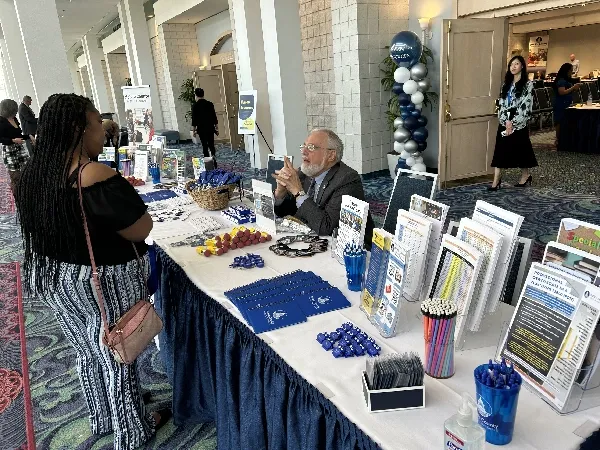The VIP Treatment
How in-person experiences can boost your teacher recruitment and retention efforts.


The VIP Treatment
Creating experiences for
teacher retention and recruitment
It’s no secret that over the past few years, teacher retention and recruitment has become harder than ever before. Teacher job satisfaction is down, and as more and more educators find themselves embroiled in polarization and controversy, more of them are retiring and resigning. With fewer college students studying education, the hiring pool to fill those open positions is shrinking. As school leaders, you need a full arsenal of strategies to combat this complex problem. But have you considered including experiential marketing amongst your tactics?
Elsewhere in this issue, we learned that experiential marketing can help you build three key advantages: better brand awareness, stronger brand loyalty and more word of mouth. (To learn more, check out "Harnessing the Power of Experiential Marketing.") And when you think about it, recruitment and retention really boil down to those three factors. You want prospective teachers to fall in love with your district, current teachers to thrive in your schools and both groups to tell their friends and family all about it.
Here, we’ll look at just a few ways that targeted, in-person experiences can boost your recruitment and retention efforts—and how real districts are employing those strategies.
Support the next generation.
As you likely already know, the future of education is facing a major challenge: there aren’t enough people becoming teachers. Data from the National Center for Education Statistics (NCES) shows that the population of college students has nearly doubled in the U.S. over the last 50 years, but the number of education majors has steadily shrunk. While education was once the most popular major—accounting for one in five students in 1970—now just 4% of college students study to become teachers.
There’s not one simple reason for this shift, but it’s worth noting that many adults aren’t encouraging the students in their lives to pursue careers in education. In a 2022 survey from the National Opinion Research Center at the University of Chicago, only 18% of adults said they were “likely” to encourage their child or another young person to become a K-12 teacher. Nearly half (44%) said they were “not at all likely” to encourage that career choice—citing factors like low pay, high stress and lack of respect.
That same year, PDK International’s annual Poll of the Public’s Attitudes Toward Public Schools found that 62% of respondents would not like their child to become a public school teacher in their community. Perhaps most disheartening, in a 2024 Pew Research study, more than half of teachers said they would not advise a young person to pursue a career in the classroom. It begs the question: How many students are initially interested in becoming teachers, only to be talked out of it by adults?

It’s clear schools have a vested interest in counteracting this troubling trend, but how? What can districts do to support young people who want to become teachers—to affirm that they’re making a good and valuable decision?
A few districts across the country have found an innovative way to show their support for future educators: teacher signing days. Like athletic signing days, these events celebrate graduating high school seniors’ commitments for their futures; but instead of committing to a college football team, these students are committing to pursue careers in education.
“I knew from the time I was a first grader that I wanted to be a teacher,” says Teresa Murphy, superintendent of Mansfield Public Schools in Massachusetts. “So I see the value of celebrating young people who know they want to be teachers.” After the Massachusetts Department of Elementary and Secondary Education suggested the idea to districts statewide, Mansfield held their first teacher signing day in 2023. “I thought that to be able to honor academia as we do athletics was a really good thing,” says Murphy.
The event plays out much like a traditional athletic signing day: Students come up to a table and sign letters of intent indicating their choice to pursue education. “They can also bring their families,” Murphy says. “For their parents to be able to show their pride, that’s important.” It’s a small experience, but it’s meaningful for the students being honored. Last year, the ceremony conflicted with a dress rehearsal for the school musical, and one of the participating students was the lead—but he came anyway. “I thought it was really meaningful, that to him, it was still an important event to attend,” says Murphy.
And at Mansfield, this signing day doubles as encouragement for current teachers as well. The first time the event was held, each participating student was asked to write a paragraph or two about a teacher who inspired them. “Those paragraphs made us say, ‘You should really show that teacher what you wrote about them,’” says Murphy. So this year, students again chose teachers who inspired them—who were then invited to the ceremony to hear those paragraphs read.
“Everybody likes to hear they’re doing well, that they’re valued and trusted,” says Murphy. “So this is a double dose of encouragement—because we’re celebrating the young people, but we’re also celebrating the teachers who have inspired them.”
At Baldwin County Public Schools in Alabama, signing day is just one part of a broader effort to encourage students to become teachers. As part of the Baldwin Proud Future Teacher Scholarship program, at least seven students per year—one from each of the district’s feeder patterns—receives a renewable scholarship to pursue education. “We stay in touch with them, and we hope that once they complete their education, they’ll come back to Baldwin County Public Schools,” says Chasity Riddick, the district’s communications coordinator.
The program also supports clubs for future teachers, and it’s these clubs that organize the signing days. And according to Vickie Locke—an English teacher at Baldwin County High School and an advisor for the Future Teachers of Alabama club—signing day doesn’t just make future educators feel special. It also spurs word of mouth, generating more interest for the clubs. “Afterward, kids who didn’t participate will come up to me and say, ‘I want to do that, but I didn’t know y’all had a club,’” says Locke. “So it’s a way to put the club out there and let those who really want to be teachers know: We’re here to support you and to be mentors for you.”
Draw in prospective teachers.
In our increasingly virtual world, you may be wondering if in-person events like job fairs are still a good way to recruit prospective teachers. Virtual job fairs and online hiring events gained traction during the pandemic, and initially it seemed they could become the “new normal.”
But that hasn’t actually been the case. In a 2023 survey by EdWeek Research Center, about one-third of K-12 human resources professionals said they were attending more in-person career fairs after the pandemic than they had prior to it. Only 17% said the same for online job fairs. And of more than 100 teacher recruitment fairs tracked so far this year by the American Association of School Personnel Administrators, fewer than 10 have been virtual. It’s not that surprising; after missing in-person events during the pandemic, people are more keen than ever to attend them now.
We’re not saying you should ignore other channels like your website in favor of in-person experiences. (In fact, if your website isn’t helping you attract candidates, our research shows you’re missing a valuable opportunity.) But neither should you count out in-person hiring events. They can be a rare chance to grab your prospective teachers’ attention and impress them.

In Alabama’s Mobile County Public Schools (MCPSS), as in most districts across the U.S., recruitment has been a challenge in recent years. “Since COVID, there’s been a higher number of retirements and resignations, and simultaneously, you have fewer students graduating from colleges of education,” says Rena Philips, MCPSS’s director of communications. “So you have a smaller pool to pull your candidates from, and then you’re having to compete with other school systems to get the same high-quality educators.”
So in the spring of 2022, MCPSS decided to hold their first districtwide teacher recruitment fair—a massive undertaking for a system with more than 90 schools. “We had a very representative committee of the school system working on this,” says Philips. Everyone from teachers to administrators to transportation and finance staff was invited to join. “We got our team together and we asked, ‘Why do you love working for Mobile County Public Schools? What differentiates us as a school system?’” she explains. Their answers would shape the direction of the event.
The committee landed on a few key messages they wanted the event to impress upon prospective teachers. One was that MCPSS encompasses a diverse array of schools. “We have a mix of urban, suburban and rural schools. We have magnet schools. We have schools for children who are deaf or blind,” says Philips. “We like to say we have a school for everybody.” So every single one of those schools had their own booth at the event, showcasing their unique academic offerings, staff and culture.
But MCPSS is more than just a group of 90-plus schools—it’s a team of people. “We have this sense of camaraderie in Mobile County,” Philips says. “We call ourselves Team MCPSS.” In addition to each school’s individual booth, event organizers set up a table where prospective job candidates could talk to award-winning teachers from across the district. “We wanted candidates to be able to ask any questions that they wanted: What’s it like teaching in Mobile County? What kind of professional development do they offer you? Do they recognize you for your hard work?” Philips explains. As an added bonus, the teachers asked to be ambassadors feel valued, too. “That showed them that we appreciate the work they do and that we want them to be out there sharing their love for the schools,” says Philips.
The MCPSS team also knew it was important to highlight the city of Mobile itself. This makes a lot of sense; in our own research on teacher recruitment, we found that geographical location was the number-one factor influencing which jobs educators apply for. As Philips puts it, “You’re not only selling your school system; you’re selling your community and your quality of life.”

With help from community partners like the Mobile Chamber of Commerce and the local realtors association, MCPSS spotlighted what’s great about their city, from nearby beaches to Mardi Gras celebrations. Attendees could even take trolley tours of downtown Mobile. “We wanted to let candidates know that Mobile is a great place not only to work but to live and play,” says Philips.
Perhaps the most impressive aspect of MCPSS’s recruitment fair was its convenience. “We wanted to make it as easy as possible for the job candidates,” says Philips. So the fair was, in essence, a one-stop shop for prospective employees. After candidates submitted their resumes at specific school booths, principals could interview them in designated private areas. Then, in an HR room, they could do all the necessary processing—like fingerprinting and background checks—to clear them for employment. While the school board would need to vote to officially hire most candidates, “we wanted you to walk out with a contract in hand,” says Philips. Everything up to that final vote was taken care of before prospective hires left the event.
To say that the event was a success would be an understatement. That first year, MCPSS hoped to attract at least 200 attendees and hire 75 new employees. In reality, nearly 450 people attended the fair, and 93 were hired. If post-event surveys are any indication, it also did a lot to boost the district’s brand. “People said they loved how organized it was, that they felt like Mobile County was a great place to work, that they wanted to be part of Team MCPSS,” says Philips. And in the two years since, the event has only grown. At their most recent career fair this spring, more than 900 candidates turned out.
Experiences like teacher recruitment fairs certainly aren’t the only way to attract people to your district. But they are an incredible opportunity to make it appealing—and easy—for candidates to apply for positions.
Show current teachers they are valued.
Of course, teacher retention is just as critical as recruitment—if not more so. In our own 2023 study, 40% of teachers surveyed said they would leave the field of education if given the opportunity. That’s not surprising when you consider that, according to research from Gallup, K-12 workers have the highest burnout rate of any industry in the U.S. But we also found that, unsurprisingly, teachers who said they were happy in their current positions were less interested in leaving their districts or education as a whole.
According to Gallup, more engaged employees show signs of better well-being, greater productivity and lower turnover. So what keeps teachers happy and engaged in their work? Citing decades of research, Gallup has identified a few statements that are good indicators of employee engagement in any sector—for example, “I know what is expected of me at work,” or, “There is someone at work who encourages my development.” In 2023, they asked more than 1,100 K-12 teachers to agree or disagree with these statements. The results were mixed.
Some of the news was good. Teachers were more likely than employees in other sectors to agree that the “the mission and vision of my organization makes me feel my job is important.” However, only a quarter of teachers said they had received recognition or praise for doing good work in the previous seven days, and less than 40% believed that their supervisor—or at least someone at work—cared about them as a person. Clearly, it’s crucial to recognize, appreciate and care for your teachers, but how? A thoughtful, well-planned experience can help you do just that.
North Texas Collegiate Academy (NTxCA) has a simple mission statement: “Love First, Teach Second.” But in 2023, Superintendent Dr. Lisa Stanley began to wonder if the district’s usual August convocation event was conveying that mission to teachers. “Traditionally, we host some incredible motivational speakers and have a keynote address,” Stanley tells us. “But by October, when I go back and survey the staff about convocation, they don’t remember the heart of the message or the name of the presenter. If we’re going to use convocation to unite us all on our mission, that should start with our board and me showing our staff that we love them—before we expect them to do the hard work and teach.”
So as the 2023-24 school year began, teachers settled into their seats for a keynote address from the local mayor. But instead of launching into a speech, he announced a surprise. The teachers were going shopping for classroom supplies—and instead of paying for a convocation speaker, the district would be footing the bill for the shopping spree.
“We all know that teachers spend an excessive amount of their own personal money to make their classrooms loving, welcoming learning environments. There’s really no other profession where we ask people to go out and buy their own supplies,” Stanley says. “They shouldn’t have to choose between going on a vacation, paying their cell phone bill or decorating their classroom. They need to have supplies. So let’s take them on a shopping spree and let them buy everything that they need.”

To make the experience even more special, NTxCA literally rolled out red carpets for teachers, leading them out to the chartered buses that would take them shopping. “We wanted to treat our teachers like celebrities, because they should be honored and esteemed in our culture,” says Stanley. “They are shaping tomorrow’s leaders. So we want them to know how important they are.”
Of course, one isolated event at the beginning of the school year will not be enough to keep your teachers feeling valued all year long. But creating an experience that not only shows staff appreciation but fills an actual need will set the right tone for a culture of care.
It’s worth mentioning that any experience that doesn’t ring true to your district’s culture and values will prove ineffective. If your students can tell your teachers aren’t happy in their jobs, a signing ceremony won’t magically make them want to study education. Teachers hired at a career fair won’t stay if they were sold on an environment that doesn’t actually exist. And one shopping spree won’t cancel out an entire school year of feeling unappreciated.
Experiences aren’t panaceas; they won’t singlehandedly solve your staffing problems. But they can get the word out more effectively and serve as firsthand proof of your district’s values. And they just might be the factor that brings an employee into your schools—or keeps them there.

